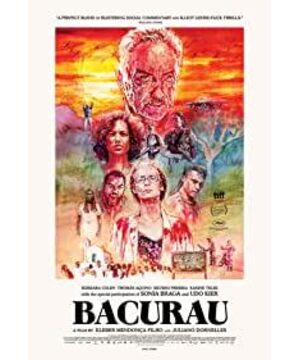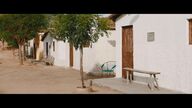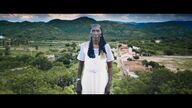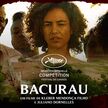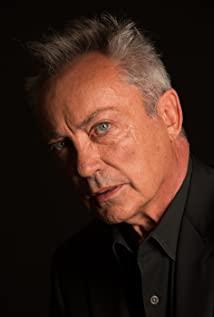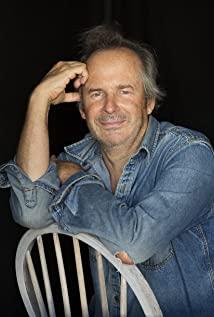Fans and friends who follow the Cannes Film Festival may already be familiar with the name Kleiber Mendoza Jr. The director, born in Recife, Brazil in 1968, has already used his first feature film "She "Sound of Time" was shortlisted for the Rotterdam Film Festival. In 2016, his second feature film "Aquarius" was directly airborne in the main competition in Cannes, conquering many media and fans including the "Cinema Manual" with extremely high quality, and became many people's top ten of the year. .
The previous work "Aquarius" is a story with a realism color, which uses the experience of a "nail house" in the director's hometown of Recife to meticulously portray the status quo of Brazilian society. But the surreal elements that appear from time to time give Mendoza's work a unique style.
Three years later, Mendoza and his art director Juliano Dohenelis, as a co-director, brought the new work "Baclau", which was once again on the main competition stage of the Cannes Film Festival without any suspense. Debut. Ranked top with a final score of 2.6 points. And in the final evaluation stage, it was unanimously loved by a jury composed of many directors, and won a jury award.
But what is more surprising is that Mendoza did not continue the previous realism style, but boldly wrote such a fable, packaged in the style of an extreme genre, and brought such a special film. .
As for why such a story was created, we may want to pay attention to current political issues in Brazil. On January 1 of this year, Bolsonaro, the leader of the Brazilian Social Liberal Party, was formally sworn in. He was regarded by the Brazilian media as the first “right-wing president” to appear in Brazil in more than 30 years. The gesture is to shoot, and I have served in the army for quite some time. More than 75% of the masses support the leader, but there are also some young people in Brazil who are caught in immense anger and despair. He put forward the slogan "Brazil is supreme", ignoring the climate crisis, and treating the Amazon rainforest as the "lung of the earth" as a fallacy. He suppressed culture, saying that art is not real work. He even insulted race, women, and LGBT groups, and was called Brazil Trump by the Western leftist media. The real Trump also posted congratulations on Twitter after Bolsonaro took office and said: The United States is with you.
Among the 20 most violent cities in the world, up to 7 are from Brazil. Because of the rampant gangs and terrorists, Brazil kills 64,000 people by shooting each year. President Bolsonaro hopes to deploy on the streets in the face of this situation. In the army, however, the police violent law enforcement and even colluding with criminals have become more serious. It was in such a general environment, combined with the president's experience, words and deeds, that Mendoza was angry and created "Baclaw."
The time of the film is set in the near future without a clear year. The first shot of the opening is a super-large perspective looking directly at the earth from the universe. Then a cosmic satellite is skipped, and it often appears in the film afterwards. Together, the drones of this film give a layer of sci-fi color to the film.
After that, the camera followed a truck to the place where the story took place, in a somewhat closed village in northeastern Brazil-Bakrau. We followed the perspective of the heroine Teresa into this village. The first event was her grandmother’s funeral. It not only fits the theme of death in the whole film, but also shows the traditional culture of Brazil, because of our oriental perspective. , Has brought us some spectacle experience, but that shock and solemnity, I believe that it can cross the national and regional boundaries to achieve synesthesia.
The subsequent series of shots showed us the daily life of this village: the magnificent celestial phenomena of Bakrao and the unique landscapes of Latin America, the villagers driving vehicles, the children in the vegetable garden, the old lady repairing the water pipe, taking a bath, and even hanging a house. There are some erotic paintings, the market, the history museum, and finally the clinic. It fully allowed the audience to appreciate the rustic atmosphere of this village, as well as the traditional culture of the region, and at the same time showed the "humanity" of the Bakrau people.
Afterwards, starting with a lens facing the sky, an airplane symbolizing a developed civilization passed over Bakrau. The teacher found that Bakrau could not be found on the network map. Then it came to the core of the whole story-the beginning of the invasion, and the noisy flying saucer became the signal of opening. The galloping horses came from what happened in Brazil, and the villagers’ hearts could no longer be settled. They also seemed to realize that something strange was about to happen.
Two well-dressed off-road bikers became the pioneers of this "invasion". Through their clothing and language, we can tell that they are also Brazilians, but they do not have any obvious regional characteristics. They obviously come from some A more modern city, and such a role as a middleman between traditional culture and foreign culture, perfectly meets the needs of avant-garde in the play. Later, from the subjective perspective of a flying machine, the two motorcyclists began to shoot and kill the villagers. The perspective followed the motorcyclists. They returned to their residence, and a group of English-speaking intruders officially appeared on the scene. The metaphor of language in this film has also fully begun to appear. The villagers of Bakrau who only speak Brazilian, the motorcycle hands who master both Brazilian and English, and the group of English-speaking tourists. The symbolic relationship of this invasion is clear. stand up.
Inside the house, the two motorcycle riders in the middle zone ushered in their own deaths due to the reason of "killing one's own person." To some extent, they were unknowingly conspirators, but because they violated certain rights, they were brutally eliminated. Such a method is almost a portrayal of a modern hegemonic state. It was also from here that a large number of violent scenes in the film brought the film into a feast of genre elements of crime and horror.
In a live broadcast vehicle, a video collection was shown on the screen, and a violent incident in a Brazilian city was staged in the form of a video, with a slightly exaggerated sound effect of the shooting, and even ranked. And such appalling behavior seems not so strange in the worldview in the film. Most people seem to have been assimilated by the culture of "violence" and become numb.
Ironically, this group of invaders also had a certain contradiction within them. On the land far away from the city, their primitive and barbaric animality was fully manifested. Even their companions can be treated ruthlessly, and they also laid the ground for the failure of this killing operation. Foreshadowing. This group of people started separate operations, but they were smashed by the villagers who had long been hidden. Plasma splashed in the bullets, and the camera neatly showed every killing. In the pleasure brought by the high degree of typification, it seems that we should also Reflect on the relationship between violence and anti-violence.
Attentive movie fans may notice that several close-up shots of different people stuffing small fruits into their mouths repeatedly and briefly appear. This is a symbolic shot with a mysterious and traditional temperament, giving the villagers "divine power" , So that the traditional culture they represent can fight against power violence and the invasion of external culture.
The part of the invader in the Baklaw History Museum may be the climax of the film. When he lazily and casually plays with the various collections in the museum, it is blasphemy and destroying traditional culture. Later, through his subjective perspective, he found that all the guns on the wall were gone. This was a "weapon of history" and a source of strength for the Baklaw people to fight back. The young Bucklau roared angrily to execute the invaders continuously.
Regarding the leaders and the leaders of the invaders, the Bakrau people executed them in their most traditional and national way-exile and burial alive.
The music of the film is a combination of traditional folk music and modern electronic music. It also demonstrates the mutual restraint and confrontation of the two cultures, and also injects vitality into the film's viewing. In the last melodious folk music, the villagers use soil to bury the criminal invaders, and Bakrau may also encounter a more severe invasion. This ending fully expresses the director's scrutiny of the current situation, but they are already fearless.
Because they are with this land, with the long and profound traditional culture, with all the people of Baklau, stubbornly fighting against the darkness.
We seem to have seen too many movies that try to show cultural conflicts and "land love" characteristics, but why "Baclaw" is particularly favored lies in the film's full balance of visual symbols and metaphors behind them. Accurate observation and description of social emotions. In addition to the strong political expression, it did not weaken the charm of the image itself, and it is bound to be inseparable from the highly categorized style of the film.
Because of this slightly exaggerated imagination, the film naturally does not have too much authenticity, and is closer to a social fable. But just like "Parasite", which won the Palme d'Or at this year's Cannes Film Festival, as long as the metaphors you want can be perfectly supported by the content, no matter what form it is, it will have a strong discourse power.
Both of these two works have adopted a genre film creation grammar, which is also inseparable from today’s film environment. The genre rule is a world-wide film grammar. Through this form, even if you don’t understand the film Audiences in the creative context are also acceptable, but if they understand the background again, they will feel a deeper shock.
The short review of the "Cinema Manual" wrote: The two directors wrote a great political novel with Bakrau. The strong vitality in this novel is a virtue necessary to counter the weirdness of contemporary far-right figures.
In the land of Latin America with a strong magical temperament, Mendoza used this work to prove a new path for realist movies in the modern context. Using an extremely simple construction and narrative method, combined with a high-level style and grammar, he brought such an extremely vigorous and powerful work, as if he himself was also a Bakerau who adhered to the village, and he was not timid in the face of the rising of the extreme right. , Declared war on Brazil’s outrageous status quo.
This article was first published on the public account [Watching a movie and seeing death]
View more about Bacurau reviews


